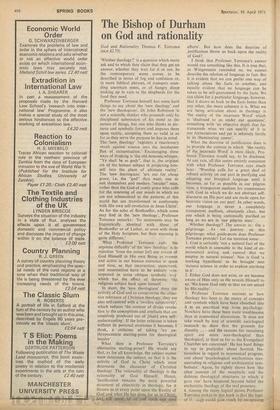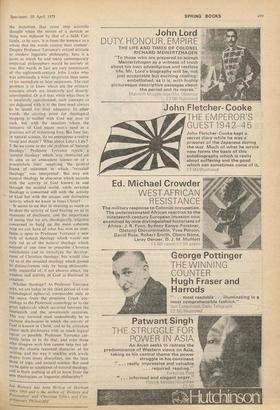The Bishop of Durham on God and rationality
God and Rationality Thomas F. Torrance (oup £2.75)
'Whither theology?' is a question which many ask and to which they claim that they get no answer, whether they wait for it or not. So the contemporary scene comes to be described in terms of fog and confusion or, in more biblical phrases, of trumpets soun- ding uncertain notes, or of hungry sheep looking up in vain to the shepherds for the food they need.
Professor Torrance himself has some hard things to say about the 'new theology' and the 'new theologians'. Dr John Robinson 'is not a scientific thinker who proceeds only by disciplined submission of his mind to the nature of things, but one who thinks in pic- tures and symbolic forms and imposes them upon reality, accepting them as valid in so far as they serve the purpose he has in mind. The 'new theology' registers a reactionary revolt against science into the incoherent flux of existentialism.' Encouraging these ways of thinking is 'the old. demonic whisper, "Ye shall be as gods", that is, the original sin of the human subject in projecting him- self into the place of ultimate reality'. The 'new theologians' are out for cheap grace, 'i.e. the "god" they want, one to suit themselves and modern "secular" man, rather than the God of costly grace who calls for the renewing of our minds in which we are not schematised to the patterns of this world but are transformed in conformity with His own self-revelation in Jesus Christ'. As for the echo of Bonhoeffer, which some may find in the 'new theology', Professor Torrance remarks: 'Its statements may be linguistically identical with those of Bonhoeffer or of Luther, or even with those of the Holy Scripture, but their meaning is quite different.'
What Professor Torrance calls the supreme difficulty' of the 'new theology' is its rejection 'from the outset [of] any notion of God Himself in His own Being as present and active in our human existence in space and time, so that incarnation, atonement, and resurrection have to be entirely rein- terpreted in some oblique symbolic way' which has the effect of throwing the religious subject back upon himself.
In short, the 'new theologians' deny the activity of God and so compromise the objec- tive reference of Christian theology; they are also self-centred with a 'swollen subjectivity', which reduces 'the content of divine revela- tion to the conceptions and artefacts that are creatively produced out of [their] own self- understanding'. If the latter criticism is taken without its personal overtones it becomes, I think, a criticism of taking 'an an- thropocentric starting-point for theological inquiry'.
What then is Professor Torrance's alternative starting-point? He would say that, as for all knowledge, the subject matter must determine the subject, so that it is the activity of God in Christ which must determine the character of Christian theology. The rationality of theology is the rationality of God Himself. Hence, 'justification remains the most powerful statement of objectivity in theology, for it throws us at every point upon the Reality of God and what Ile has done for us in Christ, and will never let us rc'sf upon our own efforts'. But how does the doctrine of justification throw us back upon the reality of God?
I think that Professor Torrance's answer would run something like this. It is true that, as Wittgenstein reminded us, we cannot describe the relation of language to fact. But it is evident that we can prefer one way of talking about the facts to another, and equally evident that no language can be taken to be self-guaranteed by the facts. We can claim for a particular language, however, that it draws us back to the facts better than any other, the more coherent it is. What we are being articulate about in theology is 'the reality of the incarnate Word' which is 'disclosed to us under our questions', something with 'an objective depth that far transcends what we can specify of it in our formulations and yet is infinitely fertile in its illuminating power'.
What the doctrine of justification does is to provide the context in which 'the reality of the incarnate Word' is most likely, Pro- fessor Torrance would say, to be disclosed. At any rate, all this seems entirely consistent with what Professor Torrance says much later: 'Worship calls for a great deal of refined activity on our part in purifying and adapting our liturgical language until it becomes, as far as possible in our pilgrim state, a transparent medium for communion with God in which we do not obstruct self- discourse on His part and are made open for heuristic vision on our part'. In other words, our language is never a completely transparent medium, absolutely clear, but one which is being continually purified as long as we are in 'our pilgrim state'.
Whither theology? The answer is: On a pilgrimage. As we journey on this pilgrimage, what guide-posts does Professor Torrance provide? Let me mention some: 1. God is certainly 'not a natural fact of the world which is amenable to the kind of ex- perimental testing and control that we employ in natural science'. Nor is God 'a working hypothesis' to be brought into 'natural science in order to explain anything in it'.
2. Either God does not exist, or we become aware of Him only as He reveals Himself to us. 'We know God only in that we are seized by His reality'.
3. Professor Torrance reminds us how theology has been at the mercy of concepts and symbols which have been absorbed into it in an uncritical way trom psychology. Nowhere have these been more troublesome than in ecumenical discussions. 'It does not take much by way of scientific sociological research to show that the grounds for disunity . . . and the reasons for remaining apart are more non-theological than theological, at least as far as the Evangelical Churches are concerned.' He has hard things to say in particular about Scottish Na- tionalism in regard to ecumenical progress, and about 'psychological mechanisms mas- querading in religious and ecclesiastical sym- bolisms'. Again, he rightly shows how 'the alien concept of the receptacle and the dubious theological structures to which it gave rise' have hindered beyond belief the eucharistic theology of the real presence.
4. Among the many logical points Professor Torrance makes in this book is that the logic of th..,logY could gain much by recognising
the transition that came into scientific thought when the notion of a particle or thing was replaced by that of a field. Cer- tainly, as he says, 'it is from the Sentence as a whole that the words receive their content'. Despite Professor Torrance's critical attitude to modern linguistic philosophy, here is a point at which he and many contemporary empirical philosophers would be entirely at one. His words in fact are very reminiscent of the eighteenth-century John Locke who was admittedly a wiser empiricist than some of his immediate or later successors. The real problem is to know which are the primary concepts which are intuitively and directly apprehended. Or is it that, while what there is is intuitively apprehended, such concepts as are delivered with it at the time need always to be tested for their adequacy. In other words, . the starting point for theological mapping is neither with God nor man as such, but with the situation where the initiative of God meets man's need in a gracious act of redeeming love. But how far, in natural science, do we presuppose a reality `mute and dumb'? What about Lenz's Law? 5. So we come to the old problem of 'natural theology'. Professor Torrance rejects a 'natural theology' which 'was abstracted on its own as an antecedent science or as a praeambula fidei' supplying 'the general frame of reference in which "revealed theology" was interpreted'. But may not natural theology be discourse which accords with the activity of God known in and through the natural world, while revealed theology is concerned still with the activity of God but with the unique and distinctive activity which we know in Jesus Christ?
It seems to me that in stressing as much as he does the activity of God bearing, on us in moments of disclosure, and the importance of seeing that we are, theologically, pilgrims concerned to buils1 up the most coherent map we can have of what has won us over, there is open to Professor Torrance a new style of natural theology which would not only rid us of the natural theology which seemed at one time to prescribe Christian conclusions and to stereotype the develop- ment of Christian theology, but would also rid us of the revealed theology which gained Its distinctiveness only by being philosophi- cally neglectful of,. if not abusive about, the wisdom and activity of God as diSclosed in creation.
Whither theology? As Professor Torrance says, we are today in the third period of vast cosmological upheaval, comparable only to the move from the primitive Greek cos- mology to the Ptolemaic cosmology or to the great upheavals which occurred between the fourteenth and the seventeenth centuries. The way forward must undoubtedly he to recreate disclosures in which the activity of God is known in Christ. and to be articulate about such disclosures with as much logical rigour as possible. Professor Torrance cer- tainly helps us to do that, and even those Who disagree with him cannot help but ad- mire the closely, reasoned character of his writing, and the way it sparkles with jewels drawn from many disciplines, not the least those of logic and natural science. But need we be quite so suspicious of natural theology, and is thei-e nothing at all to learn from the new theologians or linguistic philosophy?
Ian Ramsey has been Bishop of Durham since 1966 and is the author of 'llioloqy and Personality' and 'Christian Ethics and Con- leln polar}, Philosophy'











































 Previous page
Previous page